|
July 2011 Updates
Shabbat Chazon - שַׁבַּת חַזוֹן

[ The sorrowful holiday of Tishah B'av begins Monday, August 8th at sundown.... ]
07.31.11 (Tammuz 29, 5771) The Sabbath that immediately precedes Tishah B'Av is called "Shabbat Chazon" (the "Sabbath of vision"), since the Haftarah that is read comes from the vision of the prophet Isaiah regarding the coming destruction of the Temple:
"Hear, O heavens and give ear, O earth,
For the LORD has spoken;
Though I brought up and raised My children,
They have rebelled against me." (Isa. 1:2)
When it was first recorded, Isaiah's vision of the destruction to come was still future, and the Jews still had a chance to repent before the great tragedy befell them. However, since they refused to do teshuvah (turn back to God), calamity overtook them. Today the Haftarah is traditionally chanted to the same haunting melody as Megilat Eichah, the great lamentation of the prophet Jeremiah who was an eyewitness to the destruction and fall of Judah and Jerusalem.
During the last nine days of the Three Weeks of Sorrow it is common to confess the sins in our lives that likewise contribute to the lack of God's Presence in our midst. Hashivenu Adonai, elecha vena-shuvah; chadesh yamenu kekedem: "Turn us back to You, O LORD, and we shall be turned; renew our days as of old" (Lam. 5:21).
Though Shabbat Chazon is a time of mourning, it is also a time for hope. The Torah reading for Shabbat Chazon is always the portion of Devarim. In this portion, Moses details the victorious battles with Sihon the king of Amorites and Og the king of Bashan. Because it signifies God's victory, the sages recommend envisioning the future Temple that will be built by the Mashiach at this time. According to Jewish tradition, after the Messiah comes and restores Israel, Tishah B'Av will become one of the happiest days of the year (may He arrive soon and in our days).
King David's Praise
In light of the future glory of Zion under King Yeshua, it is good to recall King David's great words of praise:
בָּרוּךְ אַתָּה יְהוָה אֱלהֵי יִשְׂרָאֵל אָבִינוּ
מֵעוֹלָם וְעַד־עוֹלָם
לְךָ יְהוָה הַגְּדֻלָּה וְהַגְּבוּרָה וְהַתִּפְאֶרֶת וְהַנֵּצַח וְהַהוֹד
כִּי־כל בַּשָּׁמַיִם וּבָאָרֶץ
לְךָ יְהוָה הַמַּמְלָכָה וְהַמִּתְנַשֵּׂא לְכל לְראשׁ
וְהָעשֶׁר וְהַכָּבוֹד מִלְּפָנֶיךָ
וְאַתָּה מוֹשֵׁל בַּכּל וּבְיָדְךָ כּחַ וּגְבוּרָה
וּבְיָדְךָ לְגַדֵּל וּלְחַזֵּק לַכּל
וְעַתָּה אֱלהֵינוּ מוֹדִים אֲנַחְנוּ לָךְ
וּמְהַלְלִים לְשֵׁם תִּפְאַרְתֶּך

ba·rukh at·tah Adonai E·lo·hei Yisrael a·vi·nu,
me'o·lam ve'ad o·lam.
le·kha Adonai ha-ge·du·lah, ve'ha-gevurah, ve'ha-tif·e·ret, ve'ha-ne·tzah, ve'ha-hod,
ki khol ba·sha·ma·yim u·va·a·retz
le·kha Adonai ha-mam·le·kha, ve'ha-mit·na·sei le·khol le·rosh
ve'ha·o·sher ve'ha-kavod mi·le·fa·ne·kha,
ve'at·tah mo·shel ba·kol, uv·ya·de·kha ko'ach u'ge·vu·rah,
uv·ya·de·kha le·ga·del u'le·cha·zek la·kol,
ve·at·tah E·lo·hei·nu, mo·dim a·nach·nu lakh,
u'me·chal·le·lim le·shem tif·ar·te·kha
"Blessed are you, O LORD, the God of Israel our father,
forever and ever. Yours, O LORD, is the greatness and the power and
the glory and the victory and the majesty, for all that is in the heavens
and in the earth is yours. Yours is the kingdom, O LORD, and you
are exalted as head above all. Both riches and honor come from you,
and you rule over all. In your hand are power and might, and in your hand
it is to make great and to give strength to all.
And now we thank you, our God, and praise your glorious name."
(1 Chron. 29:10-13)
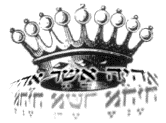
Nine Days of Mourning

[ The sorrowful holiday of Tishah B'av begins Monday, August 8th at sundown.... ]
07.31.11 (Tammuz 29, 5771) Today is Rosh Chodesh Av (i.e., Av 1), which means we are now in the mourning phase of the "Three Weeks of Sorrow," that is, the final nine days before the somber time of Tishah B'Av (i.e., Av 9). Typically marriages are not held during this time, and many Jews deliberately refrain from ostensibly pleasurable activities, such as listening to music, dancing, taking vacations, and sometimes even shaving. In fact, most Orthodox Jews will refrain from any activity that might require the recitation of the Shehecheyanu blessing.
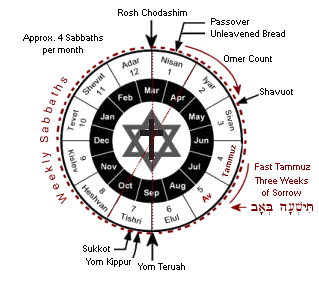 |
Among observant Jews, Tishah B'Av is regarded as the saddest day of the Jewish year (even sadder than Yom Kippur) since it was on this date that the LORD decreed that the original generation rescued from Egypt be denied entrance into the Promised Land because of the Sin of the Spies. This event was considered prophetic of other tragedies of Jewish history (based on the principle: מַעֲשֵׂה אֲבוֹת סִימָן לַבָּנִים / ma'aseh avot siman labanim: "The deeds of the fathers are signs for the children"), and indeed on precisely this date both of the Temples were destroyed and the Jewish people suffered exile. The purpose of the nine days of mourning is to instill a sense of teshuvah (repentance) in preparation for the 25 hour fast of on the Ninth of Av.
New Table Talk for Masei
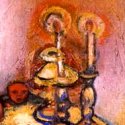
[ The following entry concerns this week's Torah reading, parashat Masei. Please read the Torah portion to "find your place" here. ]
07.28.11 (Tammuz 26, 5771) It is an age-old custom for Jews to discuss the weekly Torah portion during the Friday night Sabbath meal (before hearing it recited the following morning during services) and also during the afternoon and evening Sabbath day meals. To make it a little easier to discuss some topics, I created a new Shabbat "Table Talk" guide for parashat Masei. The guide includes a brief summary of the Torah reading, a set of questions (with answers), and some additional topics for discussion. Hopefully this material will prompt some interesting (and enjoyable) discussion for your Sabbath, chaverim. You can download the PDF file from the linked page (above) or by directly clicking here.
Since the narrative of the Torah ends with the close of the Book of Numbers (Deuteronomy is mishneh Torah - a "retelling of Torah"), parashat Masei is technically its final portion. At the end of this parashah, as with every other parashah that concludes a book of the Torah, we therefore say, Chazak, chazak, v'nitchazek (חֲזַק חֲזַק וְנִתְחַזֵּק) - "Be strong, be strong, and may we be strengthened!"
Note: This Shabbat marks Rosh Chodesh Av, which marks the start of the Nine Days of mourning that will culminate on Tishah B'Av, the destruction of the Temples. Rosh Chodesh Av also marks the anniversary of the death of Israel's first High Priest (Aaron) which is regarded as an omen of the later destruction... The sages teach that it was on the 9th of Av when the Jews heard the evil report of the spies and cried out to return to Egypt - an act of treason so serious that God decreed that the "exodus generation" would wander in the desert 40 years until they all died out. Jewish tradition therefore regards the 9th of Av as a "day of crying" throughout all the generations, that is, until the Messiah comes... May all Israel cry out for Yeshua soon, and in our day may they say: Hashivenu (הֲשִׁיבֵנוּ): "Turn us back to yourself, O LORD, so that we may return to you" (Lam. 5:21).
 |
New Hebrew Meditation:
Everlasting Consolation

07.26.11 (Tammuz 24, 5771) Today I wrote a brief Hebrew meditation ("Everlasting Consolation") based on Isaiah 40:8, "The grass withers, the flower fades, but the word of our God will stand forever." This verse sets up a great contrast between olam ha-zeh and olam haba – between this present world and the heavenly realm. Unlike the grass of the field that dries up or flowers that soon fade, the word of God stands forever. And despite the frailty of man and the inevitability of physical death, God's truth endures, which is a foundation upon which we can rest.
But how are the metaphors that man is "like dried up grass" or a "withered flower" intended to comfort us? Do they not, on the contrary, lead us to regard our lives as vain and perhaps meaningless? Yes indeed. Our lives are empty and vain apart from God and His truth. If we find ourselves wincing over such images, it is perhaps time to reexamine the state of our faith: To the extent that we regard this world as our "home" we will find the transience of life to be tragic... For those who are seeking a heavenly habitation, the "City of God" and the fulfillment of the promise of Zion, the fleeting nature of this evil world is ultimately a form of consolation...
הוֹדִיעֵנִי יְהוָה קִצִּי
וּמִדַּת יָמַי מַה־הִיא
אֵדְעָה מֶה־חָדֵל אָנִי
ho·di·e·ni · Adonai · kitz·tzi,
u·mid·dat · ya·mai · mah · hi,
e·de· ah · meh · cha·del · a·ni

"O LORD, make me to know my end
and what is the measure of my days;
let me know how quickly my life will pass"
(Psalm 39:4)

Hebrew Study Card
King David continues in this psalm, "Behold, you have made my days a few handbreadths, and my lifetime is as nothing before you (וְחֶלְדִּי כְאַיִן נֶגְדֶּךָ). Surely all mankind stands as a mere vanity (הֶבֶל)! Selah" (Psalm 39:5).
This world is not our home; we are "strangers" here. The heart of faith is always in collision with this world. Yes, it is an affliction to wait for the LORD, a sort of "homesickness" of heart... The apostle Paul says our loneliness and alienation prepare for us an "eternal weight of glory" beyond all comparison, because we are not looking at what can be seen but at what cannot be seen. "For what can be seen is temporary, but what cannot be seen is eternal" (2 Cor. 4:17-18). Just as the "two-souled" man is unstable in all his ways, so the process of being "educated for eternity" means learning to focus our heart's passion and hope on the glory of heaven. "For where your treasure is, there will your heart be also."
Understanding that every breath and every heartbeat is an irreplaceable gift given to you from God is sobering and helps focus the soul's affections. This is one of the "rock bottom" issues of life: There is a God, and you are not Him; and one day you will die and give account for the lease you were given on life... May it please God to help us "redeem the time," for the days are evil (Eph. 5:16; Col. 4:6).
 |
The Three Weeks of Sorrow...
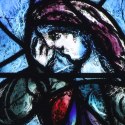
[ The "Three Weeks of Sorrow" run from July 18th through August 8th this year... ]
07.25.11 (Tammuz 23, 5771) On the Jewish calendar, 21 days (running from the 17th day of Tammuz through the 9th day of Av) are set apart to commemorate the three weeks of tragedy that immediately preceded the destruction of the Holy Temple and the exile of the Jewish people from the Promised Land. In Jewish tradition, these are called yemei bein ha-metzarim (יְמֵי בֵּין הַמְּצָרִים), "the days in the midst of distress," a phrase taken directly from the doleful Book of Lamentations: "Judah has gone into exile ... her pursuers have all overtaken her in the midst of her distresses" (בֵּין הַמְּצָרִים).
Note that the word "distress" (i.e., metzar: מֵצַר) comes from a root word (i.e., tzarah: צָרָה) that means to "make narrow or restricted" (the Yiddish word "tsuris" comes from this root), whereas the word for "deliverance" or "salvation" (i.e., yeshuah: יְשׁוּעָה) means to "make wide" or "make sufficient." These two ideas can be seen in a verse from the Psalms: "Out of my distress (מִן־הַמֵּצַר) I called on the LORD; the LORD answered me and set me in a wide open place" (Psalm 118:5). Among other things, deliverance (salvation) is always a transition from bondage to freedom...
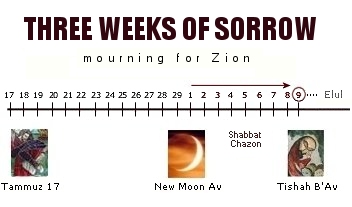 |
During this three week period of national mourning, the weekly prophetic readings are all "Haftarahs of Rebuke," and teshuvah (repentance) is a theme of most Jewish services. In addition, no weddings or other joyous events are held during this time. Beginning on the first of the month of Av, mourning customs are traditionally practiced in anticipation of the great fast day of Tishah B'Av, when the Book of Lamentations (Megillat Eichah) is plaintively recited during the evening service.
The tears of the prophet Jeremiah represent God's compassionate love for the Jewish people; the Book of Lamentations is really God's cry... God cares about the suffering of His people: b'khol tzaratam lo tzar (בְּכָל־צָרָתָם לוֹ צָר) - "In all their affliction he was afflicted" (Isa. 63:9). Even after all the horrors that befell the people of Judah due to God's disciplinary judgment, the LORD still encouraged them to seek Him again. "The faithful love of the LORD (חַסְדֵי יהוה) never ceases, and his compassions never fail. They are new every morning; great is your faithfulness" (Lam. 3:22-23). Our response to the faithful love of the LORD is teshuvah (i.e., תְּשׁוּבָה, "turning [shuv] to God"). In Modern Hebrew teshuvah means an "answer" to a shelah (שְׁאֵלָה), or a question. God's love for us is the question, and our teshuvah – our turning of the heart toward Him – is the answer. We return to the LORD when we truly acknowledge that He is our Father and our King:
הֲשִׁיבֵנוּ יְהוָה אֵלֶיךָ וְנָשׁוּבָה
חַדֵּשׁ יָמֵינוּ כְּקֶדֶם
ha·shi·ve·nu Adonai e·ley·kha ve·na·shu·vah,
cha·desh ya·me·nu ke·ke·dem

"Turn us back to yourself, O LORD, so that we may return to you;
renew our days as of old" (Lam. 5:21)

Hebrew Study Card
The Three Weeks of Sorrow (culminating in Tishah B'Av) are undoubtedly the saddest and most solemn days of the Jewish calendar, with great emphasis placed on the need for repentance and heartfelt cries for the salvation of the Jewish people. This year, the dates (beginning at sundown) are as follows on the Gregorian calendar:
Parashat Masei - פרשת מסעי
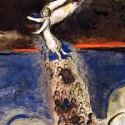
[ The following entry concerns this week's Torah reading, parashat Masei. Please read the Torah portion to "find your place" here. ]
07.24.11 (Tammuz 22, 5771) The Torah portion for this coming Shabbat is Masei ("journeys of," from masa, "breaking camp," referring to a "stage" or camp site in a journey). Parashat Masei is the tenth (and final portion) of the Book of Numbers. Indeed, since the Torah technically ends with the close of the Book of Numbers (Deuteronomy is mishneh Torah - a "retelling of Torah"), Masei is the final portion of the narrative of the Torah...
The boundaries of the land of Canaan to be occupied are provided in this portion of Torah. Note that these borders are not the same as those described earlier to Abraham (Gen. 15:18-21), since that area will be given to Israel after the Messiah returns to restore Zion during the Millennial Kingdom (see Ezekiel 47:15-48:35). During that time, the Jerusalem will be the center of the earth and renamed Adonai Shammah (יְהוָה שָׁמָּה), "the LORD is there."

While the earlier promise that Israel would occupy 'from the Nile to the Euphrates' awaits its fulfillment, in this Torah portion the description of the promised land is restricted to "the land of Canaan according to its borders" (34:2-13), that is, to the local region occupied by the seven Canaanite nations living there at the time of the conquest under Joshua.
Parashat Masei is traditionally read near the new moon of the month of Av, in anticipation of the nine days of mourning (for the lost Temple) that precede Tishah B'Av -- the saddest day of the Jewish calendar (Tishah B'Av begins Monday, August 8th at sundown this year). The Mishnah states, "As [the month of] Av enters, we diminish joy," and the Gemara states, "All who mourn the destruction of Jerusalem will merit the celebration of her rebirth" (Ta'anit 30a). Mourning for the loss of the Temple is appropriate until the Mashiach comes and restores it. Masei is read at this time to signal hope that one day Jerusalem will be rebuilt and the promises made to Israel will be fulfilled.
When someone dies, there is a grieving process you can go through that leads to closure. In Jewish tradition, this process involves the stages of shivah, sheloshim, and avelut - a full year of grieving over the loss of a loved one. If, however, it's uncertain that someone has died, there is no end to mourning. We see this Jacob's life after his son Joseph disappeared: Jacob wasn't certain of his son's death, and therefore he mourned for years and years. He continued to mourn because he still held hope that his son lived. For this very reason do we both mourn and yet hold hope during the Three Weeks of Sorrow and Tishah B'Av. We mourn over the loss of what could have been, yet we hold hope in the restoration of Jerusalem, the "City of the Great King" (Psalm 48:2, Matt. 5:35) by the hand of Yeshua our Mashiach....
The Month of Av
The month of Av (which begins Sunday, July 31 at sundown this year) is traditionally regarded as the most tragic in the Jewish calendar. On the first day of this month, Aaron (the first High Priest of Israel) died (Num. 33:38), which was regarded as a prophetic omen of the future destruction of both of the Temples on the Ninth of Av.
Since Rosh Chodesh Av marks the time of mourning for Zion, we humbly ask the LORD to help us prepare for the coming time of teshuvah:
יְהִי רָצוֹן מִלְּפָנֵיךָ יהוה אֱלהֵינוּ וֵאלהֵי אֲבוֹתֵינוּ
שֶׁתְּחַדֵּשׁ עָלֵינוּ חדֶשׁ טוֹב בַּאֲדנֵינוּ יֵשׁוּעַ הַמָּשִׁיחַ אָמֵן
ye·hi ra·tzon mil·fa·ne·kha Adonai E·lo·hey·nu ve·lo·hey a·vo·tey·nu
she·te·cha·desh a·ley·nu cho·desh tov, ba'a·do·ney·nu Ye·shu·ah ha·ma·shi·ach, a·men

"May it be Your will, LORD our God and God of our fathers,
that you renew for us a good month in our Lord Yeshua the Messiah. Amen."

Download Study Card
New Table Talk for Mattot

[ The following entry concerns this week's Torah reading, parashat Mattot. Please read the Torah portion to "find your place" here. ]
07.22.11 (Tammuz 20, 5771) It is an age-old custom for Jews to discuss the weekly Torah portion during the Friday night Sabbath meal (before hearing it recited the following morning during services). To make it a little easier to discuss some topics, I created a new Shabbat "Table Talk" guide for parashat Mattot. The guide includes a brief summary of the Torah reading, a set of questions (with answers), and some additional topics for discussion. Hopefully this material will prompt some interesting (and enjoyable) discussion around your Sabbath table, chaverim. You can download the PDF file from the linked page (above) or by directly clicking here.
קִוִּיתִי יְהוָה קִוְּתָה נַפְשִׁי וְלִדְבָרוֹ הוֹחָלְתִּי
נַפְשִׁי לַאדנָי מִשּׁמְרִים לַבּקֶר שׁמְרִים לַבּקֶר
ki·vi·ti Adonai ki·ve·tah nafshi, ve-lidvaro ho·chal·ti
nafshi la'donai mi-shomerim la-boker, shomerim la-boker

"I wait for the LORD, my soul waits, and in his word I hope;
my soul waits for the Lord more than watchmen for the morning,
more than watchmen for the morning." (Psalm 130:5-6)
Personal Update: My fibromyalgia has worsened and I am getting arthritis symptoms in my hands, knuckles, and wrists. Sleep has become quite painful for me... Please offer up a prayer for my healing, chaverim. Thank you so much.
His Love Overcomes...
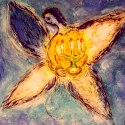
07.20.11 (Tammuz 18, 5771) Psalm 117 is the shortest psalm (and chapter) of the Jewish Scriptures. It is one of the "Hallel" (praise) group of songs (i.e., 113-118) traditionally recited during the Jewish holidays. It is a mere two verses in length, just 17 words (in Hebrew):
הַלְלוּ אֶת־יְהוָה כָּל־גּוֹיִם
שַׁבְּחוּהוּ כָּל־הָאֻמִּים
כִּי גָבַר עָלֵינוּ חַסְדּוֹ
וֶאֱמֶת־יְהוָה לְעוֹלָם
הַלְלוּ־יָהּ
ha·le·lu et Adonai kol go·yim, sha·be·chu·hu kol ha·u·mim,
ki ga·var a·lei·nu chas·do, ve'e·met Adonai le'olam. ha·le·lu-Yah

"Praise the LORD, all nations! Exalt him all peoples!
For his steadfast love has overcome us,
and the faithfulness of the LORD endures forever.
Praise the LORD" (Psalm 117)
Download Study Card
A wonderful phrase in this triumphant song is ki gavar aleinu chasdo (כִּי גָבַר עָלֵינוּ חַסְדּוֹ), "for strong upon us is His faithful love." The word translated "strong" (גָּבַר) means "prevailing" or "triumphing," and has the connotation of masculine strength (i.e., the words "mighty man" (גִּבּוֹר) and "power" (גְּבוּרָה) come from the same root). Because of God's strong love for us and because of His ongoing faithfulness (i.e., emet: אֱמֶת), we are commanded to offer praise and thanks to the LORD. We make our "boast" in God's chesed (חֶסֶד) - His unfailing love - by glorifying and sanctifying His Name... Notice that the word "Hallelujah" (הַלְלוּ־יָהּ) at the end of the psalm is the plural imperative form of the verb halal (הָלַל), meaning to "shine" in radiant gratitude before God. The opening phrase "halelu et Adonai" ("praise the LORD") therefore clearly links the Divine Name YHVH (יְהוָה) with the Name Yah (יָהּ).
The question is raised by some of the sages as to why the nations of the earth should praise the LORD for God's kindness given to Israel. Rav Yitzchak replied, "The princes of the nations plan countless anti-Semitic schemes to destroy the Jewish people, but our Merciful God always manages to foil their plots. Their secret councils are so well-guarded that the Jewish people are often unaware of all the ways the nations plot to harm them, and therefore they are unaware of how God saves them. Only the wicked nations see clearly how God's kindness to the Jewish people is overwhelming - and therefore, only the nations of the earth can praise Him this way." The chesed of the LORD is "mighty toward us" not only in the past, but "the faithfulness (i.e., truth) of the LORD endures forever," which means that it continues to the present hour unto eternity. As the Apostle Paul affirmed, God's truth is eternal, and His gifts and calling are irrevocable (Rom. 11:29).
Psalm 117 alludes to both the praise of the nations for God's saving acts performed during the Exodus and to the coming reign of the Messiah Yeshua in Zion (the intermediary period of praise to the LORD for Yeshua's first advent is presently reserved for the followers of the Messiah during this age). The words "praise the LORD all nations" (הַלְלוּ אֶת־יְהוָה כָּל־גּוֹיִם) prophetically refers to the acclaim the LORD will receive in the coming millennial kingdom, when the nations will all be converted and given lashon ha-kodesh (the holy language) to praise His Name (Zeph. 3:9; Psalm 86:9). If the nations of the earth are commanded to praise the LORD for His faithfulness to Israel - both for the glory of the Exodus and for the reign of Messiah in Zion - how much more are we to praise His Name and shine our gratitude before Him for the glorious redemption we have in Yeshua? Hallelu-Yah!
רוֹצֶה יְהוָה אֶת־יְרֵאָיו אֶת־הַמְיַחֲלִים לְחַסְדּוֹ
ro·tzeh Adonai et ye·re'av, et-ham·yach·a·lim le·chasdo

"The LORD delights in those who revere Him,
in those who hope for his loyal love."
(Psalm 147:11)
"Feeding" God...

07.19.11 (Tammuz 17, 5771) In last week's Torah (Pinchas) we read about "God's food," the daily sacrifice of the male lamb with bread and wine, etc. (Num. 28:2-3). As I said last week, the key idea of the Torah centers on the idea of sacrifice, and in particular, the continual sacrifice of the lamb. And there is no doubt that the sacrificial love of Yeshua, the great Lamb of God (שֵׂה הָאֱלהִים), most satisfied the hunger of God's heart as a "sweet smelling savor" (Eph. 5:2), since through Him God's redemptive love was fulfilled...
When we say we "hunger for God," it is vital to remember that it is God who first hungers for us. God desires our love and fellowship... We "feed God" by offering heartfelt prayer, walking in steadfast faith, expressing love and yearning for God through the study of the Scriptures and through worship, by giving tzedakah, and especially by loving and caring for others. Every day we are given an opportunity to "feed God" through the expression of our faith and hope. Our obedience to the truth is what "feeds" God - "Behold, to obey is better than sacrifice, and to hearken than the fat of rams" (1 Sam. 15:22). When God "knocks on the door of your heart" to commune with you, what "food" will you be serving? (Rev. 3:20)
May each of us help satisfy the "hunger of God" by loving Him in the truth....
וְאָהַבְתָּ אֵת יהוה אֱלהֶיךָ בְּכָל־לְבָבְךָ
וּבְכָל־נַפְשְׁךָ וּבְכָל־מְאדֶךָ׃
ve'a·hav·ta et Adonai E·lo·he·kha be'khol le·vav·kah
uv'khol naf·she·kha uv'khol me'o·de·kha

"You shall love the Lord your God with all your heart
and with all your soul and with all your might" (Deut. 6:5)
Postscript:
Regarding the question of "feeding" God through sacrifice, someone asked me why God desired the killing of animals, especially in light of the Scripture that says God desires mercy rather than sacrifice (Hos. 6:6). In response, first it must be stressed that the commandment, "thou shalt not kill" (Exod. 20:13) is better rendered as "thou shalt not murder," and therefore we surely shouldn't infer that God desired to kill animals in a sense that would imply any anger or violence... No, the desire of God for blood atonement for sin was primarily directed to His provision given in the Messiah, and the sacrifices of innocent animals prefigured the greater work of Yeshua's redemption. There is a "cost" attended to our forgiveness - the cost of what is most precious to God's heart. The animals were created with "living souls" (כָּל־נֶפֶשׁ הַחַיָּה), though certain qualifications need to be made, since only man was created in the "image and likeness" of God (Gen. 1:27), and only man was imparted with the "breath the breath of life" directly from God (Gen. 2:7). This is not to say that animals are not possessed of a "soul," but it is apparently of a different nature than that imparted to mankind, or at least this is the common view of the sages. Nonetheless, God knows when the sparrow falls and cares about the mother bird and her brood (Matt. 10:29; Deut. 22:6-7). Likewise, there are very specific procedures for slaughtering animals that are intended to minimize any pain they might feel. Some Jewish values that support the humane care of creation are bal tashchit and tza'ar ba'alei chayim, the principle of refraining from causing unnecessary pain to animals.... In Psalm 150 it is said, "Let everything that has breath praise the LORD" (כּל הַנְּשָׁמָה תְּהַלֵּל יָהּ) - suggesting that animals who have neshamah (breath) praise God and perhaps that they have a soul that exists after death.
 |
The Sanctity of Our Words

[ The following entry concerns this week's Torah reading, parashat Mattot. Please read the Torah portion to "find your place" here. ]
07.18.11 (Tammuz 16, 5771) Among other topics, this week's Torah portion mentions vows (i.e., nedarim: נְדָרִים) and oaths (i.e., shevuot: שְׁבוּעוֹת) made to the LORD (Num. 30:2-3). The sages distinguish between these by saying that a vow (נֶדֶר) represents a promise to do something (or to refrain from doing something), whereas an oath (שְׁבוּעָה) represents a sworn testimony that something is true (or false). Among Orthodox Jews, it is customary to say "bli neder" (בְּלִי נֶדֶר) after making any sort of commitment to avoid the risk of making a vow. Bli neder means, "I'll do my best to keep my word to you on this, though understand that I am not taking a vow..." Just before Yom Kippur, the Kol Nidrei service is intended to absolve legal liability for failing to keep personal vows. The Aramaic phrase kol nidrei (כָּל נִדְרֵי) means "all vows."
The Torah states that a whoever makes a vow or takes an oath "shall not break his word" (לא יַחֵל דְּבָרוֹ). The word translated "break" comes from the root chalal (חָלַל) which means to profane or make unholy. This is the same root used in the phrase chillul Hashem (חִלוּל הַשֵּׁם) which means to desecrate the Name of the LORD: "And you shall not profane (חָלַל) My holy name; but I will be sanctified (קָדַשׁ) among the children of Israel: I am the Lord who sanctifies you" (Lev. 22:32). Since it is chillul HaShem to break your word, keeping your word is a form of kiddush HaShem (קִדּוּשׁ הַשֵּׁם), "sanctifying the Name of the LORD."
The Torah links both vows and oaths with the soul (i.e., nefesh: נֶפֶשׁ). An oath is considered a "bond" or a binding obligation upon the soul (lit., "a bond on his soul," אִסָּר עַל־נַפְשׁוֹ). This statement leads to the question about the relationship between our words and the state of our souls....
In Genesis 2:7, the Scriptures describe the creation of man: "Then the LORD God formed (יֵצֶר) the man of dust from the ground and breathed (נָפַח) into his nostrils the breath of life (נִשְׁמַת חַיִּים), and the man became a living soul (נֶפֶשׁ חַיָּה)." The word yetzer ("formed") refers to something shaped, like pottery fashioned by the hand of a potter. Just as a potter purposes a shape before forming an object, so God intended the image of man. The sages use the analogy of a glassblower who creates a glass vessel. Just as a glassblower blows into a tube to form a vessel from molten glass, so the breath (i.e., neshamah: נְשָׁמָה) that comes from the LORD functions as spirit (רוּחַ) that forms the human soul (i.e., nefesh: נֶפֶשׁ). The Targum states that God breathed into Adam the ability to think and to speak. In other words, thought and speech are two primary characteristics of the image (tzelem) and likeness (demut) of God. Our use of words are directly linked to the "breath of God" within us, and therefore breaking our word defaces the image of God within us....
The LORD God of Israel is faithful and true (Deut. 7:9; Psalm 12:6; Matt. 24:35). He always keeps His word and therefore He wants us to do so as well. Indeed, Yeshua Himself is called the Word of God (דְּבַר הָאֱלהִים). As image bearers of God, our words likewise are to carry deep meaning and sanctity. Just as God's words are trustworthy, true, and lifegiving, so should be our words and communication. The sages say that the words we speak - whether good or bad - call for a response in the realm of spirit. This is hinted at by the Hebrew word for "thing" (i.e., devar: דָּבָר), which also means "word." Listen to the words of your heart and understand that they are devarim, "things" that are defining the course of your life right now. Our thoughts and words "exhale" the breath of God that was given to each of us. In a very real sense they are "prayers" we are constantly offering...
Yeshua warned us to abstain from making any kind of vow or oath since our word alone should be enough (Matt. 5:33-37). He also spoke of "good and evil treasures of the heart" that produce actions that are expressed in our words (Luke 6:45). Our inward motive determines our thinking, which in turn affects the way we act and use words. Therefore He warned: "I tell you, on the day of judgment people will give account for every careless (ἀργὸν) word they speak, for by your words you will be justified, and by your words you will be condemned" (Matt. 12:36-37). Our very salvation is based on confession of the truth, and therefore we must be sure to use communication as a means of expressing the love and grace of God (Rom. 10:9; Col. 4:6). We must be on guard to keep away from lashon hara (evil speech) by focusing on what is worthy, lovely, and of good report (Prov. 13:3, Phil. 4:8). As David prayed: "Let the words of my mouth and the meditation of my heart be acceptable in your sight, O LORD, my rock and my redeemer" (Psalm 19:14):
יִהְיוּ לְרָצוֹן אִמְרֵי־פִי
וְהֶגְיוֹן לִבִּי לְפָנֶיךָ יְהוָה צוּרִי וְגאֲלִי
ye·he·yu le·ra·tzon im·rei-fi
ve·heg·yon lib·bi le·fa·ne·kha Adonai tzu·ri ve·go·a·li

Let the words of my mouth and the meditation of my heart
be acceptable to You, O LORD, my rock and my redeemer.
May it please God to help us use our words for the purpose of strengthening and upbuilding (οἰκοδομὴν) one another (Eph. 4:29). May our words always be gracious and "seasoned with salt" (Col. 4:6). Amen. "Whoever keeps His word, in him truly the love of God is perfected" (1 John 2:5).
Parshat Mattot - פרשת מטות

[ The following entry concerns this week's Torah reading, parashat Mattot. Please read the Torah portion to "find your place" here. ]
07.17.11 (Tammuz 15, 5771) Last week's Torah portion (Pinchas) ended with the central sacrifice required at the Tabernacle, namely, the daily sacrifice of a defect-free male lamb with unleavened bread and wine (i.e., korban tamid: קָרְבַּן תָּמִיד). In addition to this daily offering, various sacrifices for Shabbat, the new moon, and the other festivals of the Jewish year were also specified. This week's Torah reading (Mattot) begins with laws regarding the making of vows (nedarim). After these laws were defined, the Israelites were commanded to wage war against the Midianites for attempting to seduce the people to sin at the incident of Baal Peor. During the ensuing battle, the wicked magician Balaam was killed, as well as five tribal kings of the land of Midian. The portion ends with the tribes of Reuben, Gad, and half of the tribe of Manasseh settling east of the Jordan River, in the territories formerly occupied by the Amorite kings Sichon and Og.
כִּי שֶׁמֶשׁ וּמָגֵן יְהוָה אֱלהִים
חֵן וְכָבוֹד יִתֵּן יְהוָה
לא יִמְנַע־טוֹב לַהלְכִים בְּתָמִים
יְהוָה צְבָאוֹת אַשְׁרֵי אָדָם בּטֵחַ בָּךְ
ki · she·mesh · u'ma·gen · Adonai · Elohim
chen · ve'kha·vod · yit·ten · Adonai
lo · yimna-tov · la-cho·le·khim · be'tamim
Adonai · Tze·va·ot · ash·rei · a·dam · bo·te'ach · bakh

"For the LORD God is a sun and shield;
the LORD bestows grace and honor.
No good thing does he withhold from those who walk wholeheartedly.
O LORD of hosts, blessed is the one who trusts in you!"
(Psalm 84:11-12)
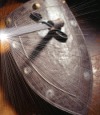
Note: I hope to add some further commentary to this Torah portion later this week. Meanwhile, please see the brief Hebrew Meditation, "Teshuvah of the Tongue."
Tzom Tammuz - צום תמוז
07.17.11 (Tammuz 15, 5771) Tuesday, July 19th is the 17th of Tammuz, a fast day (tzom) that marks the beginning of the "Three Weeks of Sorrow" (a 21 day period of national mourning which is completed on Tishah B'Av, which begins Monday, August 8th at sundown this year). The purpose of the fast is to instill a sense of teshuvah (repentance) by recalling specific tragedies that befell the Jewish people during this time. Despite the heartache of the Jewish people, when the Messiah Yeshua returns (may it be speedily in our time), the Three Weeks will turn into a time full of "gladness and cheerful feasts" (Zech. 8:19).
New Table Talk for Pinchas
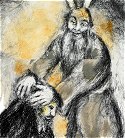
[ The following entry concerns this week's Torah reading, parashat Pinchas. Please read the Torah portion to "find your place" here. ]
07.15.11 (Tammuz 13, 5771) It is encouraging and edifying to discuss the weekly Torah portion with your family and friends during the Friday night Sabbath meal. To make it a little easier to discuss some topics, I created a new Shabbat "Table Talk" guide for parashat Pinchas. The guide includes a brief summary of the Torah reading, a set of questions (with answers), and some additional topics for discussion. Hopefully this material will prompt some interesting (and enjoyable) discussion around your Sabbath table, chaverim. You can download the PDF file from the linked page (above) or by directly clicking here.
As I've discussed elsewhere on the site, the great revelation at Sinai focused on the giving of the altar to Israel. However -- as this portion of Torah makes clear-- the central sacrifice upon this altar was the daily sacrifice (i.e., korban tamid: קָרְבַּן תָּמִיד) of a defect-free male lamb with unleavened bread and wine. The LORD calls this "My offering, My bread... which was ordained at Mount Sinai (Num. 28:2-8). In other words, the ministry of the Tabernacle itself constantly foreshadowed of the coming Lamb of God who would be offered upon the altar "made without hands" to secure our eternal redemption (Heb. 9:11-12). All glory be to Yeshua our beloved Savior!
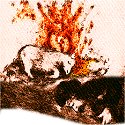 |
Our Torah portion also describes Moses' first and last glimpse of the Promised Land. Recall that in Lekh Lekha Abram was called ha-ivri (הָעִבְרִי) - "the Hebrew," a term that means "one who has crossed over" (עָבַר) from another place. Rashi identifies this "other place" as Ur Kasdim (אוּר כַּשְׂדִים), the "light of the Chaldees," located east of the Euphrates River, though the midrash (Genesis Rabbah) symbolically identifies it as the realm of idolatry: "The whole world stood on one side, but Abram crossed over to the other." Abram separated himself from a world steeped in idolatry and polytheism by worshipping One God who is the sole Creator of all things.... Understood in this way, being "Hebrew" means being regarded as an "other," a "stranger," or an "outsider" to idolatrous world culture by believing, accepting, and trusting in God's promises for a better world (Heb. 11:10).
The death of Moses east of the Jordan is symbolic: Moses could only take the people so far, and something more was needed. A "new son" must arise to lead Israel into the place of promise. Mount "Abarim" (הַר הָעֲבָרִים) was actually a symbolic "range of crossing" that demarcated the realm of faith and promise. Notice that the word "Hebrew" (i.e., Ivri: עִבְרִי) shares the same root (עֲבַר). It is also called Mount Nebo in Deut. 34:1. It is the place where Moses could not "cross over" to enter the Promised Land (of course I am not suggesting that Moses was not a "Hebrew," but only that his death east of the Jordan signified the need for Yehoshua (Yeshua) to come and lead the people in).

Personal Update: As some of you might know, we were out of town the last five days visiting my mother and her husband (both of whom have been ill lately). Our visit was worthwhile and healing, and I praise the LORD that our car did not break down during our trip. For those of you who have sent me an e-mail recently, please give me a little more time to get back to you, since I am busy trying to get back into the swing of things over here. Thank you for your patience. And to those of you who prayed for us during this time, please accept our heartfelt thanks. There is never any real ministry apart from an ongoing miracle from God, sustained by God's people.... Shalom and love to you...
God's Greater Zeal...
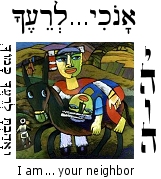
[ The following entry briefly explores a fews ideas about "zeal" in light of this week's Torah reading (i.e., parashat Pinchas). I hope you might find it helpful, chaverim. ]
07.13.11 (Tammuz 11, 5771) According to the Jewish historian Josephus (i.e., Yosef Ben Matityahu, c. 37-100 AD), there were four primary "sects" or "denominations" of Jews during the time of Jesus. In very general terms, these can be defined as follows:
- The Saduccees (i.e., צַדּוּקִים, "righteous ones," from Tzadok the priest). These were members of the (Hellenized) priestly class responsible for the Temple and its operations. The Sadducees rejected the idea of Oral Torah and accepted only the written words of Moses as authoritative. After the Hasmonean revolt (168-165 BC), the Sadducees assumed control of the Temple and represented the aristocracy of the Jewish people. Over time, however, they became increasingly cosmopolitan and adopted the philosophical ideas of Hellenistic (i.e., Greek) culture.
- The Pharisees (i.e., פְּרוּשִׁים, "interpreters"). These were Torah scholars who sought to teach the common people how to live the Jewish life. The Pharisees regarded themselves as heirs of the oral tradition that began with the appointment of the 70 elders of Israel under Moses (Avot 1:1). In the generation prior to Jesus, two outstanding Pharisees - Hillel and Shammai - led important schools in Jerusalem (called Bet Hillel and Bet Shammai, respectively). These two schools differed in their approach to questions regarding the application of the law to daily life, and many of their arguments were preserved in the Mishnah. (In general, Bet Hillel was more liberal than Bet Shammai.) The Pharisees of Jesus' day would have been disciples of one (or both) of these schools.
- The Essenes (perhaps from oseh hatorah: עוֹשֵׂה הַתּוֹרָה, "doing Torah"). These were mystical ascetics who repudiated the Hellenized priesthood (i.e., Sadducees) and moved to the Judean desert near the Dead Sea to await the apocalypse. The Essene leadership regarded itself as the true heirs of the Aaronic priesthood and awaited the appearance of the Teacher of Righteousness (מוֹרֶה הַצֶּדֶק) who would interpret Torah mysteries and guide them in the way of life. (Note that Jesus was not an Essene since he was not a vegetarian, he did not advocate regular ritual immersion in a mikvah, and he commanded lepers to offer sacrifices at the Temple.)
- The Zealots (i.e., קנאים, "ardent ones"). These were political agitators that sought to incite the Jews to rebel against Roman rule by force of arms, if necessary. They refused to pay tribute to Caesar on the ground that this was a violation of the principle that God was the only King of Israel (Matt. 22:17). Two of Jesus' disciples were sympathetic to Zealotry: Simon the Zealot (ζηλωτής) and Judas Iscariot (perhaps meaning "Judas the Daggerman," surnamed after the sica, or Roman dagger, see note at the end of this entry). It should be noted that in Hebrew, the word "zeal" (i.e., kana: קָנָא) can be used in various ways, whereas the term "zealot" (הַקַּנָּאִי) usually refers to someone who agitated for the political overthrow of Rome during the Second Temple period.
Zeal can be a good thing or bad thing, of course, depending on the heart's motivation and the nature of reality. Perhaps the first "zealot" of Israel was Aaron's grandson Pinchas. In our Torah portion, we read: "Pinchas the son of Eleazar, son of Aaron the priest, has turned back my wrath from the people of Israel, in that he was zealous with my zeal among them, so that I did not consume the people of Israel in my zeal" (Num. 25:11). The word translated "zeal" in this verse is kana (קָנָא), usually translated as "zeal," "ardor," "fervor," "desire," "devotion," "jealousy," or "envy" in the Scriptures. (In the ancient Greek translation of the Torah (i.e., the LXX), kana is often translated using the word zelao (ζηλόω), from which the English word "zeal" is derived.) As already mentioned, "zeal" can be a positive quality (indicating passionate concern for others, striving for the good, and desiring righteousness), or a negative quality (indicating petty jealousy, envy, pride, and malice).
There are many people who are entirely sincere in their convictions, but they are sincerely wrong... In the time of the Second Temple, for instance, the Zealots despised the rule of Rome. Their political hatred caused them to blindly regard anyone who didn't share their passion as a personal enemy. In one of the great tragedies of Jewish history, these zealots actually killed more Jews than did the Romans themselves! And how many Christians these days "kill" relationships with other believers because of their particular zeal regarding some doctrinal question? I am not suggesting that doctrine is unimportant, but before you pick up that sword to do the business of Pinchas, you might do well to consider your heart's attitude...
You don't have to be a political zealot to have "zeal," of course. Zeal is essentially an emotional response to perceived value and truth... It's well known that Jesus faced some of his fiercest opposition from the Pharisees, who were "Torah zealots." These were the professors of theology, the camel-swallowing teachers of the law, and the gatekeepers of Jewish identity and tradition... For an example of their approach, the Gospel records an incident where a certain "lawyer" (i.e., νομικός or "Torah sage") stood up and aggressively challenged (ἐκπειράζων) Jesus to explain what he must do to inherit eternal life (Luke 10:25-28). Jesus first responded by asking the man a question of his own: How do you read the Torah? Like most good teachers, Jesus shifted the question back to the person who was asking it. The way you read (i.e., interpret) is the result of other, more basic, presuppositions you are making.
This Torah zealot was certainly well-studied in Scripture. He did not provide a litany of 613 commandments to perform, nor did he focus on the Ten Commandments. Instead he replied by citing the Ve'ahavta portion of the Shema ("You shall love the Lord your God with all your heart and with all your soul and with all your strength and with all your mind") and added the obligation to "love your neighbor as yourself" (Lev. 19:18). The man's answer was technically correct, of course, though you might wonder if there wasn't a hint of irony in Jesus' reply: "You have answered correctly; do this, and you will live" (Luke 10:28).
וְאָהַבְתָּ אֵת יהוה אֱלהֶיךָ בְּכָל־לְבָבְךָ
וּבְכָל־נַפְשְׁךָ וּבְכָל־מְאדֶךָ׃
ve'a·hav·ta et Adonai E·lo·he·kha be'khol le·vav·kah
uv'khol naf·she·kha uv'khol me'o·de·kha

"You shall love the Lord your God with all your heart
and with all your soul and with all your strength" (Deut. 6:5)
וְאָהַבְתָּ לְרֵעֲךָ כָּמוֹךָ אֲנִי יהוה
ve'a·hav·ta le're·a·kha ka·mo·kha a·ni Adonai

"You shall love your neighbor as yourself. I am the LORD" (Lev. 19:18)
The problem, of course, is that most people - even zealously religious people - don't actually "do this," though they may claim otherwise. After all, truly loving God with all your heart and genuinely loving your neighbor as yourself are surely the most difficult of all the commandments, and indeed, all the other ethical language of Scripture amounts to little else but commentary to this fundamental truth (Matt. 22:40). If people could keep these two commandments, then there would be no need for a Savior. The cross would then be regarded as "foolishness" and the entire mission of Jesus would be absurd.
Salvation means (negatively) being set free from "the law of sin and death" and (positively) being "reborn" so that we can truly love God and others. It is not a question of "willpower" or the "zeal" of man; it is not a question of what I can do but rather what God can do (John 1:13). The assumption that human actions are sufficient to merit eternal life (i.e., through performing loving acts) is therefore the problem of sin itself. The "law of sin and death" (תּוֹרַת הַחֵטְא וְהַמָּוֶת) operates on this very principle: As long as you think you can merit eternal life by means of your own efforts, you are relating to God as Judge (אֱלהִים) rather than as Savior (יהוה). You have yet to experience inner brokenness and therefore believe you can "justify yourself." The cross of Jesus is the negation of this principle and represents the "end of the law for righteousness to all who believe."
Jesus, however, surely knew that people could not save themselves, despite their best efforts. Our Torah sage intellectually knew what God's requirements were, but he was powerless to live them out in his life. Knowing the truth is not the same thing as living it. A zeal for truth is wonderful if it is lived out in real life, but it is self-deception to "draw near to God with the lips" while having a dead heart (Isa. 29:13). Truly loving God with all your heart, soul, mind and strength is simply impossible for the unregenerated heart. By nature people are "spiritually dead" and self-absorbed. Jesus knew that it is precisely because we are unable to love that we need Him. He understood that it required his passion and sacrificial death to impart life to those who were spiritually dead.... "We love Him because He first loved us" (1 John 4:9).
Unsatisfied with Jesus' response, the zealous sage then "wanted to justify himself" (θέλων δικαιῶσαι ἑαυτὸν) by attempting to qualify the definition of "neighbor." He therefore asked Jesus, "Who is my neighbor?" (Luke 10:29). Some background to this question might help. Jewish tradition tended to regard the concept of "neighbor" (i.e., rea: רֵעַ) as referring only to one's fellow Jew, and therefore the obligation to love "others" outside the community did not apply. In response to the man's question (and addressing his underlying assumption), Jesus told the story of a man traveling from Jerusalem to Jericho who "fell among thieves." This story illustrates various types of people as they "walk the road" of life and how they respond to the suffering of others.
Soren Kierkegaard comments:
The first man was a peaceful traveler who walked along the road from Jericho to Jerusalem, along a lawful road. The second man was a robber who "walked along the same road" – and yet on an unlawful road. Then a priest came "along the same road"; he saw the poor unfortunate man who had been assaulted by the robber. Perhaps he was momentarily moved but went right on by. He walked the road of indifference. Next a Levite came "along the same road." He saw the poor unfortunate man; he too walked past unmoved, continuing his road. The Levite walked "along the same road" but was walking his way, the way of selfishness and callousness. Finally a Samaritan came "along the same road." He found the poor unfortunate man on the road of mercy. He showed by example how to walk the road of mercy; he demonstrated that the road, spiritually speaking, is precisely this; how one walks. This is why the Gospel says, "Go and do likewise." Yes, there were five travelers who walked "along the same road," and yet each one walked his own road.
Jesus then asked, "Which of these three, do you think, proved to be a neighbor to the man who fell among the thieves?" When the Torah sage answered, "the one who showed mercy," Jesus again said, "do this, and you will live."

Notice again that Jesus responded to the original question by means of redirection: "How do you read the Scriptures?" "Which of these was a neighbor?" "What do you think?" Like all good teachers, Jesus was reluctant to simply give a direct answer. No, he expected people to work out the problem for themselves. After all, each of us is responsible for how we choose to "walk" the road of life. We all have zeal, desire, and passion, but the question is how is that zeal directed? What direction does it take down the road of life? Reason is often the slave of our passions. As Jesus said, "Wisdom is justified by her children."
Instead of attempting to qualify someone as worthy of our love, Jesus wants us to be worthy and loving ourselves. Are you offended by the lack of love shown toward you? Then act as a true lover by showing compassion. Go and "do this" (Luke 10:29-37).
There is a "false zeal" that leads people to estrangement and confusion. Withholding love from others is ultimately grounded in an appeal to God as the administrator of Justice. It is an appeal to God as Elohim (אֱלהִים), not as YHVH (יהוה), the Compassionate Source of Life. If we insist on our rights, we appeal to principles of justice, i.e., to God as the Lawgiver. But if we intend to have God be the Judge of others, we must appeal to Him to be our own Judge as well. If we have an unforgiving spirit toward others, we will not be forgiven (Matt. 6:15); if we are judgmental toward them, we ourselves will be put on trial; if we are cruel and ungiving toward them, we will experience life as hellish, miserable and mean. This reciprocal principle of Kingdom life appears throughout Jesus' teaching. According to your faith, be it done unto you (Matt. 9:29). As you forgive, so you shall be forgiven (Matt. 6:14); as you judge, so you shall be judged (Matt. 7:2); as you show mercy, so you shall be shown mercy (Matt. 5:7); as you give unto others, so it shall be given unto you (Luke 6:38). This "as principle" works the other way around, too: "Whoever diligently seeks good seeks favor, but evil comes to him who searches for it" (Prov. 11:27).
Zeal needs to be carefully tested to ensure that it is imbued with genuine love and humility. This is a matter of honest self-examination. The zeal of Pinchas was considered righteous because his indignation was rooted in the desire to save Israel from God's judgment (Num. 25:11). Though he killed a leader of Israel, God knew his zeal was based on love, and therefore his action was accepted.
Jealousy is a complex emotion that primarily centers on the fear of losing the affection of the beloved. Hence the LORD is called the "Zealous God" (אֵל קַנָּא), an anthropomorphic description that evokes the image of a loving and protective groom (or even a "jealous lover"). God is not some far-off deity who is disengaged from our lives. No, the zeal of the LORD means that God is passionately concerned with the ordering of our heart's affections... He watches us lovingly and closely, like a faithful and passionate husband watches over his beloved wife. He is entirely committed to our relationship with Him, but are we putting other desires, affections, or interests ahead of His love?
Abraham Heschel said, "In a controversy, the instant we feel anger, we have already ceased striving for truth and have begun striving for ourselves." Anger is a signal, a message. Sometimes it used to disguise fear, though it is often related to lust (or control). When we sense that we are not in control, we get angry. "What causes wars and quarrels among you? Is it not this, that your lusts (ἡδονῶν ὑμῶν) are at war within you?" (James 4:1). The zeal for one's lusts - for "my will be done, on earth as it is in heaven" - leads to destruction and death. As James the Righteous warned: "There is a spirit in us which longs to envy" (James 4:5).
Finally, it should be clear that the "zeal of the LORD" represents God's passion to save the world from sin and death. As the prophet Isaiah wrote:
"For to us a child is born, to us a son is given; and the government shall be upon his shoulder, and his name shall be called Wonderful Counselor, Mighty God, Everlasting Father, Prince of Peace. Of the increase of his government and of peace there will be no end, on the throne of David and over his kingdom, to establish it and to uphold it with justice and with righteousness from this time forth and forevermore. The zeal of the LORD of hosts (קִנְאַת יהוה צְבָאוֹת) will do this" (Isa. 9:6-7).
"Truth is lacking, and he who departs from evil makes himself a prey. The LORD saw it, and it displeased him that there was no justice. He saw that there was no man, and wondered that there was no one to intercede; then his own arm brought him salvation, and his righteousness upheld him. He put on righteousness as a breastplate, and a helmet of salvation on his head; he put on garments of vengeance for clothing, and wrapped himself in zeal (קִנְאָה) as a cloak (Isa. 59:16-17).
It was the "zeal for God's house" that "ate Jesus up" and caused his undoing, at least from a worldly perspective (Psalm 69:9). He overturned the tables at the Temple and stopped the daily sacrifice for the sake of our salvation. It was His zeal that led Him to the Cross at Moriah, there to passionately suffer and die for our sins. His death was a "whole burnt offering" to God - the Substance of which the shadows of the Temple foretold... Ironically enough, it was the Sinat Chinam of the zealots of Israel that ultimately led to the death of Jesus, but this "evil zeal" was overturned by God's greater zeal for the salvation of the world.
The zeal of the LORD (קִנְאַת יהוה) represents His passion and eagerness to help those who trust in Him. Man's zeal is always insufficient, since if it were enough, mankind could save itself by truly practicing the works of love. God's zeal, however, is of altogether different order and is entirely sufficient for salvation. "With man this is impossible, but with God all things are possible" (Matt. 19:26). Self-justification - of any sort - attempts to operate under the principle of the "law of sin and death." It is essentially an appeal to God as Judge (אֱלהִים) rather than as Compassion LORD (יהוה). It is the Spirit that gives us life - though at the price of the death of the ego. As Jesus said, "Truly, truly, I say to you, unless a grain of wheat falls into the earth and dies, it remains alone; but if it dies, it bears much fruit" (John 12:24). We do not need to seek to become more zealous but rather to trust in the zealous love of God for our lives. The passion that led Jesus to "sweat great drops of blood" and to endure the shame of the Cross is the same passion that is present to you, if you have faith enough to believe... Kinat Adonai Tzeva'ot ta'aseh zot: "The zeal of the LORD of hosts will do this" (Isa. 9:7).
 |
The Gospel of Pinchas - בְּשׂוֹרַת פינחס
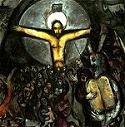
[ The following entry concerns this week's Torah reading, parashat Pinchas. Please read the Torah portion to "find your place" here. ]
07.12.11 (Tammuz 10, 5771) In my parsha study of Pinchas, I pointed out that the broken Vav that appears in Numbers 25:12 is a textual oddity that alludes to the brokenness of the Messiah for our ultimate deliverance:
 |
Since Vav represents the number of Man, the broken Vav represents a man that is broken. This verse then points to a man has been broken for the sake of a covenant of peace that brought atonement to Israel - a clear picture of Yeshua the Mashiach and His ultimate deliverance for us. Note further that the broken word shalom could also be read as שׁלים, meaning "complete," indicating that the covenant is one of completion, finality, and perfection.
According to the sages, the covenant of peace was a guarantee to Pinchas that he would free from the influence of the malakh ha-mavet (the Angel of Death). Therefore Pinchas was transformed into the prophet Elijah who was taken up and never died. Because Pinchas kept the people true to their circumcision, he merited being present at every Brit Milah, and therefore the "Chair of Elijah" is really the Chair of Pinchas!
There is another textual oddity regarding this matter. The letter Yod in the name Pinchas (Num. 25:11) is undersized. As the smallest of the Hebrew letters, the Yod is considered a picture of humility. The zeal of Pinchas is therefore understood in light of his humilty and devotion. Even though Pinchas had executed judgment on behalf of the LORD, he was given peace.
The sages further note that the Hebrew the phrase, "he [Pinchas] made atonement for the people of Israel" (וַיְכַפֵּר עַל־בְּנֵי יִשְׂרָאֵל) does not use the standard לכפּר construct ("to atone" for) but instead uses יְכַפֵּר, and therefore could read: "he atones for Israel till the end of all generations."
The idea of the "Covenant of Peace" (בְּרִית שָׁלוֹם) appears throughout the Scriptures, of course, and is made explicit in the Brit Chadashah (New Testament). Therefore one of the Names of God is "The God of Peace" (אֱלהֵי הַשָּׁלוֹם). God has made peace with mankind through the sacrifice of His Son Yeshua (Rom. 5:1):
He has delivered us from the domain of darkness and transferred us to the kingdom of his beloved Son, in whom we have redemption, the forgiveness of sins... And, having made peace through the blood of his cross, he reconciled all things to himself... (Col. 1:13-14, 20)
Yeshua is the true Peacemaker who is called "the Prince of Peace" (שַׂר־שָׁלוֹם, Isa. 9:6). He is the bechor (firstborn, πρωτοτοκος) of all creation; the radiance (zohar) of God's glory, and the exact representation ("stamp," "imprint" or "die") of his God's essence and Person (χαρακτηρ της υποστασεως του Θεου - "the character of God's substance" (Heb. 1:3)). All things were created by him and for him, and in him all things subsist (Col. 1:16-17). Indeed, in "all things" Yeshua has the preeminence. To all those who submit by faith to the sacrifice of God's Son for their sins, the LORD offers a new covenant of peace, an Eternal Healing of the rift between God and man.
The Central Idea of Torah

[ The following entry concerns this week's Torah reading, parashat Pinchas. Please read the Torah portion to "find your place" here. ]
07.11.11 (Tammuz 9, 5771) Last week's Torah portion (Balak) concluded with the story of Pinchas (פִּינְחָס), whose zealotry saved Israel from catastrophe. Recall that under the advice of the false prophet Balaam (בִּלְעָם), young Moabite women were used to seduce the Israelite men at the outskirts of the camp. According to Rashi, before a Moabite temptress would consent to sexual relations, she would require that the man bow down before the god of Moab, named Baal Peor (בַּעַל פְּעוֹר). This reveals the connection between fornication (i.e., zenut: זְנוּת) and avodah zarah ("strange worship" or idolatry).
After Israel "joined itself to Baal Peor," the anger of the LORD began to burn (Num. 25:1-3), and Moses was instructed to impale and hang all the leaders who were illicitly involved with the Moabites. "Take all the chiefs of the people and hang them in the sun before the LORD, that the fierce anger of the LORD may turn away from Israel" (Num. 25:4). Moses then instructed the judges (שְׁפָטִים) of Israel to slay everyone who had "joined themselves to the idol." According to the Talmud (Sanhedrin 82), many members of the tribe of Shimon then went to their leader, Zimri (זִמְרִי), to complain. Zimri then assembled 24,000 Israelites and abducted Cozbi (כָּזְבִּי), the daughter of King Balak. In a show of chutzpah, Zimri brought her before the congregation of Israel and challenged Moses, "Son of Amram, is a heathen woman forbidden or permitted? And should you say that she is forbidden, who permitted Yitro's daughter to you?" Moses did not have an immediate answer, so Zimri defiantly took Cozbi into a tent to have sexual relations with her. Meanwhile, the LORD sent a plague that began killing the followers of Zimri.
The sages note that Moses' lapse of recalling the law against intermarriage was to provide an opportunity for God to vindicate his selection of Pinchas to be a priest of Israel. Pinchas, the grandson of Aaron, then appealed to Moses: "O great uncle! Did you not teach us when you descended from Sinai that he who cohabits with a heathen woman is punished by zealots?" Pinchas then went after Zimri and Cozbi and discovered them in the very act. He took his spear and threw it, skewering them both (Num. 25:8). After this, God stopped the plague, though not before the 24,000 followers of Zimri were all killed (Num. 25:9).
Pinchas is described as a zealot (קַנָּאִי, from the same word as "jealous" or "envy") in the Torah (Num. 25:11). Some commentators suggest that he "took the law into his own hands," though it's clear that his zeal was considered the righteous response to the situation. צְדָקָה תַּצִּיל מִמָּוֶת / tzedakah hatzil mi-mavet: "rightousness saves from death" (Prov. 10:2; 11:4). The ulterior motive of Balaam and the Moabites was to destroy the Jews by enticing them to worship the god of Moab, and this was as serious a matter as the sin of the Golden Calf. Pinchas realized that fornication (i.e., zenut) would lead to the destruction of the Jewish people. His courageous and righteous action was therefore justified and the LORD honored him a brit kehunat olam (בְּרִית כְּהֻנַּת עוֹלָם), a "covenant of a perpetual priesthood" (Num. 25:11-13). Because he risked his life for the sake of the truth, God established his appointment as a priest in Israel with special standing.
After the plague had ended, Moses was instructed to count the Israelite tribes for the purposes of inheritance in the Promised Land (Num. 26:1-2,53). He was then told to ascend Mount Avarim (הַר הָעֲבָרִים) to glimpse the land before he died. Moses asked the LORD who should be appointed as his successor to lead the people of Israel: "Let the LORD, the God of the spirits of all flesh (אֱלהֵי הָרוּחת לְכָל־בָּשָׂר), appoint a man over the congregation" (Num. 27:16). So the LORD said to Moses, "Take Joshua the son of Nun (יְהוֹשֻׁעַ בִּן־נוּן), a man in whom is the Spirit (אִישׁ אֲשֶׁר־רוּחַ בּו), and lay your hand on him. (Note that the practice of semichah [סְמִיכָה], or "laying on of hands," was used for the purposes of sacrifice as well as for the transfer Moses' authority to Joshua. It is a picture of "sacrificial leadership.")
It is interesting, in this connection, that the LORD did not choose Pinchas to be Moses' successor. This is almost surprising, since the narrative that leads up to the choice of Moses' successor suggests that Pinchas would have been the logical choice. Pinchas was full of zeal who saved Israel from destruction. He was honored with an eternal covenant of peace. He was renowed as a great hero of Israel. Even the Torah portion itself is named in his honor....
To try to understand why Pinchas was not chosen, some of the sages note that immediately following the appointment of Joshua as Israel's new leader, the LORD commanded Moses regarding the continual offering, or the Korban Tamid (Num. 27:22-23, 28:1-4). Is there any connection between the idea of continual sacrifice and the selection of Joshua as the one who would lead Israel into the Promised Land?
The Central Sacrifice
According to a fascinating midrash cited by Rabbi Yaakov ibn Chaviv, several of the sages of the Mishnah (i.e., Tannaim) attempted to choose the central verse that summarized the meaning of the entire Torah. Ben Zoma said, "We have found the most all-inclusive verse to be, 'Hear O Israel, the LORD is our God; the LORD is One'" (Deut. 6:4). Ben Nanas said, "We have found the most all-inclusive verse to be, 'You shall love your neighbor as yourself'" (Lev. 19:18). Shimon ben Pazi said, "We have found the most all-inclusive verse to be, 'The one lamb you shall offer in the morning, and the other lamb you shall offer at twilight'" (Num. 28:4). One of the sages stood up and said, "It is ben Pazi who is correct."
In other words, the key idea of the Torah centers on the idea of sacrifice, and in particular, the continual sacrifice of the lamb. The daily sacrifice of the lamb is more important than either the Shema or even the duty to love others... The continual (i.e., tamid: תָּמִיד) sacrifice of the lamb is central to the meaning of the Torah. It is the Torah's most all-inclusive idea.
Rashi notes that Joshua embodied the concept of "continual sacrifice" (קָרְבָּן תָּמִיד) in his life. He rose up early and remained late at night in the Tent of Meeting, "never departing" from it (Exod. 33:11). Within the tent Joshua would study Torah and worship the LORD. "Elazar, Pinchas, and the Seventy Elders were surely worthy, but Moses chose Joshua because he had always sacrificed his personal comfort to excel in Torah knowledge" (Rashi on Avot 1:1). Joshua's constant devotion made him a "living sacrifice" (i.e., korban chai: קָרְבָּן חַי, see Rom. 12:1-2), similar to the Korban Talmid that God desired every day. It was Joshua's constancy that made him a better guardian of the Torah than Pinchas. As it is written: נצֵר תְּאֵנָה יאכַל פִּרְיָהּ / notzer te'enah yochal piryah: "He who guards the fig tree will eat its fruit" (Prov. 27:18). The Torah is compared to a fig tree because its fruits are gathered little by little over time, the product of constancy and faithfulness.
Joshua (יְהוֹשֻׁעַ) is a picture of Yeshua (יֵשׁוּעַ) our Messiah, of course, who always abode within his father's house and served him faithfully (John 8:29; 15:9-10). Yeshua's life was one of continual sacrifice in the service of his heavenly Father (John 10:15, Phil. 2:7-8; Eph. 5:2; Mark 10:44, etc.). His love functioned as the Ner Tamid (נֵר תָּמִיד), the continuously burning light of the world (John 8:12). Yeshua is our Korban Tamid (קָרְבָּן תָּמִיד), our "lamb offered in the morning and in the evening," and His sacrificial life is the embodiment of all the Torah's commandments! He is the goal (τέλος) of the Torah for righteousness to all who believe (Rom. 10:4). The heart of the Torah is the same as the "law of the Gospel," since God is One and His will is centered in the sacrificial love of Yeshua our Messiah.
It is Yeshua, the Perfecter of Torah, who leads us into the Promised Land of God's blessing. He is the Torah's most all-inclusive idea!
 |
Parashat Pinchas - פינחס

[ The following entry concerns this week's Torah reading, parashat Pinchas. Please read the Torah portion to "find your place" here. ]
07.10.11 (Tammuz 8, 5771) Last week's Torah portion (Balak) concerned the evil King Balak and the wicked prophet Balaam, but this week's portion is about the heroic zeal of Pinchas (Phinehas), the late-born grandson of Aaron the priest, to whom the LORD awarded a brit kehunat olam (בְּרִית כְּהֻנַּת עוֹלָם), a "covenant of a perpetual priesthood." As you will see, Pinchas is a picture of the Messiah Yeshua, and the covenant of priesthood given to him is a picture of the greater priesthood after the order of Malki-Tzedek.
Traditional Jewish thinking maintains that when Aaron received the promise of the priesthood from the LORD, it applied only to his future children and their descendants. Since his grandson Pinchas had already been born at the time the promise was given, however, Pinchas did not automatically receive this honor, especially since his father Eleazar (the son of Aaron) was married to an "outsider" -- namely, the daughter of Yitro (also called Putiel, Exod. 6:25). This explains Rashi's statement that the other tribes mocked Pinchas. How dare he kill a nassi (prince) of Israel (i.e., Zimri), especially since Pinchas' mother was regarded as an idol worshipper! Pinchas' zeal for the honor of the LORD, however, overruled their tribalism, and he was appointed a priest with special standing before the LORD.
God looks at the heart, chaverim, and is able to make those who have zeal for Him true priests of the LORD! You don't have to be born Jewish to impress the LORD God of Israel, since He's no respecter of persons (Rom. 2:11). Not only can He create spiritual children of Abraham from the stones of the ground (Matt. 3:9; Luke 3:8), but He can turn someone considered a non-Jew (by the Rabbis, anyway) into a priest of Israel (1 Pet. 2:9-10). Indeed, many descendants of Pinchas later became the most faithful of the High Priests of Israel during the First Temple period.
Note that according to one midrash, when Zimri and Cozbi (the Midianite princess) were cavorting, they actually ran inside the Tabernacle compound itself - directly past Moses and the people who were weeping at its entrance (Num. 25:6)! Pinchas then took a spear from the Tabernacle guards and followed after them. When he caught up with them within the Tent of Meeting itself, he pierced them through (Num. 25:7-8). After this, thousands of men from the tribe of Simeon ran in after him, seeking to kill him. Pinchas was in such a state of terror that "his soul left him" and the souls of Nadav and Abihu (Aaron's deceased sons) entered his body -- and by this means he became a Kohen.
Parashat Pinchas (like parashat Emor in Leviticus) also includes mention of all of the (sacrifices of the) mo'edim (holidays) given to Israel (Num. 28). These include the daily (tamid), weekly (Shabbat), monthly (Rosh Chodesh) sacrifices, as well as the sacrifices assigned to the special holidays: Passover, Shavuot, Rosh Hoshannah (Terumah), Yom Kippur, Sukkot and Shemini Atzeret. Remembering the joys of the Temple and the special celebrations of the Jewish people are thought to add a contrast to the otherwise somber time of reflection during the Three Weeks of Sorrow.
 |
New "Table Talk" for Balak

[ The following entry concerns this week's Torah reading, parashat Balak. Please read the Torah portion to "find your place" here. ]
07.07.11 (Tammuz 5, 5771) It is encouraging and edifying to discuss the weekly Torah portion with your family and friends during the Friday night Sabbath meal. To make it a little easier to discuss some topics, I created a new Shabbat "Table Talk" guide for parashat Balak. The guide includes a brief summary of the Torah reading, a set of questions (with answers), and some additional topics for discussion. Hopefully this material will prompt some interesting (and enjoyable) discussion around your Sabbath table, chaverim. You can download the PDF file from the linked page (above) or by directly clicking here.
Unlike Balaam, who was a paradigm of a "double-minded" man -- shiftless and unstable in all his ways -- God is "not a man that He should lie, nor the son of man, that He should repent" (Num. 23:19). His word is full of integrity and truth: "The grass withers, the flower fades, but the word of our God will stand forever" (Isa. 40:8).
לא אִישׁ אֵל וִיכַזֵּב וּבֶן־אָדָם וְיִתְנֶחָם
הַהוּא אָמַר וְלא יַעֲשֶׂה וְדִבֶּר וְלא יְקִימֶנָּה
lo ish El vi-khalzev, u'ven-adam ve'yitnecham,
hahu amar ve'lo ya'asheh? ve'diber ve'lo yekimenah?

"God is not man, that he should lie, or a son of man, that he should repent.
Has he said, and will he not do it? Or has he spoken, and will he not fulfill it?"
(Num. 23:19)
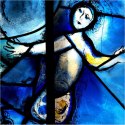
Download Study Card
God's faithfulness and promises constitute the substance of our hope in a world filled with vanity, inevitable decay, and fleeting shadows:
יָבֵשׁ חָצִיר נָבֵל צִיץ
וּדְבַר־אֱלֹהֵינוּ יָקוּם לְעוֹלָם
ya·vesh cha·tzir na·vel tzitz,
u'de·var E·lo·he·nu ya·kum le'olam

"The grass withers, the flower fades,
but the word of our God will stand forever"
(Isa. 40:8)

Download Study Card
Please keep this ministry in your prayers, chaverim. We sincerely wish you a heartfelt "Shabbat Shalom" in the love and kindness of Yeshua our LORD...
The Fortunes of Affliction
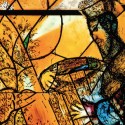
07.07.11 (Tammuz 5, 5771) I know many of you are in pain, struggling to hang on to hope, waiting for the fulfillment of the promise of your salvation given in Yeshua. Suffering is sometimes so difficult because it can seem senseless... Besides the shock of various "big" sufferings that come our way, we often face smaller, even petty, ones - the heaviness and drain of chronic affliction and the banality of ongoing pain. I called my elderly mom today and she is suffering a good deal, as is her husband... So are many of my friends - and even my young children. Sometimes it seems the world is drowning in tears and my heart feels like it will break. At times like this, I need to remember the words of King David:
אַשְׁרֵי הַגֶּבֶר אֲשֶׁר־תְּיַסְּרֶנּוּ יָּהּ
וּמִתּוֹרָתְךָ תְלַמְּדֶנּוּ
ash·rei ha-ge·ver ash·er te'ya·se·re·nu Yah,
u'mi-to·ra·te·kha tal·me·de·nu

"Fortunate is the person whom You afflict, LORD;
You teach him from Your Torah."
(Psalm 94:12)
Notice that this verse says that yissurim (suffering) is a blessing for those who are being taught by God, since it leads to "sheket," quietness from days of evil (v.13). I need to consciously remember that God's providential hand is in everything for good: gam zu l'tovah (גַּם זוּ לְטוֹבָה), "this too is for the best." I affirm that God is loving and wonderfully gracious and will use all things - even "this momentary affliction" to for work a surpassing greatness (ὑπερβολή) and eternal weight of glory" (2 Cor. 4:17).
Suffering is a mystery, perhaps the oldest mystery next to sin itself. The whole world "groans" because of tza'ar ba'elei chayim, "the pain of all living creatures" (Rom. 8:22). The idea that we cannot fathom why the wicked appear to prosper while the righteous suffer can be summed up as "ein beyadeinu," it is not within our hands to understand... And yet like King David we must trust that God uses affliction in our lives for good. The heartache that comes from groaning or longing for God's righteousness to be fulfilled is sometimes called yissurei ahavah – "the troubles of love." Yeshua is the Master teacher of what it means to patiently suffer for the sake of God's love. May He give you consolation and comfort even today...
 |
Quick Summary of Balak

[ The following entry provides a brief summary of parashat Balak that I wrote for the Shabbat Table Talk page (see above). Please read the Torah portion for more information... ]
07.06.11 (Tammuz 4, 5771) Last week's Torah portion (Chukat) ended with the description of events that occurred some 38 years after the "Sin of the Spies." The Exodus generation had finally died out, and the new generation was getting ready to enter the Promised Land. Both Sihon, the king of the Amorites, and Og, the king of Bashan, had tried to prevent the Jewish people from passing through their borders to get to the Promised Land, but both kings were decisively defeated by Israel.
This week's Torah portion is named after a Moabite king named Balak (בָּלָק). The Israelites were camped east of the Jordan River, near the border of the land of Moab. When king Balak considered how the Israelites had defeated the Amorites, he began to fear they would try to take over the entire region, and therefore he sought alliance with the nation of Midian to create a united front. The Midianite princes explained that since Moses used the Name of the LORD to strike down enemies in battle, king Balak should seek the services of a Midianite magician named Balaam (בִּלְעָם), since he knew the Divine Name and could use it to invoke a curse against Israel. Balak then sent messengers to Balaam offering him a lucrative reward if he would come and curse the Israelites.
After hearing the king's request, however, Balaam sent the messengers back to Balak with the reply that God had told him not to curse the Jewish people, for they were blessed. Balak then delegated his highest dignitaries to return to Balaam and to offered him great honor and financial rewards if he would reconsider. When Balaam consulted with God the second time, he was allowed to go, though he was warned to speak only whatever God commanded him.
The very next morning, Balaam saddled his donkey and began making his way to Moab. As he journeyed, however, his donkey saw the Angel of the LORD blocking the way. As she balked and brayed, Balaam beat the animal until God gave her a voice to rebuke him. God then opened Balaam's eyes to see the Angel, who repeated the warning to speak only as he was directed.
When he finally arrived in Moab, Balaam instructed king Balak to build seven altars and to offer a ram and a bull on each one in a sacrificial rite. As Balaam went to consult with the LORD, God "put a word in his mouth" that forced him to proclaim God's words of blessings upon Israel. When Balak heard this, he was exasperated and took Balaam to a different place, hoping that the prophet would be enabled to curse the Israelites from there. At each place, however, Balaam blessed the Israelites, to the great consternation of Balak. Finally, king Balak dismissed Balaam, but before he returned to Midian, Balaam prophesied the destruction of Moab and the surrounding nations.
Though God miraculously had overruled his tongue so that he was unable to curse Israel, Balaam remained perverse of heart and plotted with Balak about how to weaken the people by enticing them to sin (Num. 31:6). Balaam reasoned that if he was successful, Israel's blessing would be withdrawn and the LORD would then judge them for their transgression. Apparently Balaam brought young Midianite women to the edge of Israel's camp to offer themselves to the Israelite men on the condition that they worship "Baal Peor," a local semitic deity. When the Israelite men began cavorting with the women, God immediately ordered the leaders of the people to be slain.
In punishment for their idolatry, a plague broke out and the Moses instructed the judges to kill all those who "yoked themselves to Baal of Peor." Before the order was carried out, however, a prince from the tribe of Simeon (i.e., Zimri) publicly took a Midianite princess into a tent set up near the Tabernacle. When Pinchas (Phinehas), the son of Eleazar (and grandson of Aaron) saw this, however, he took up a spear and impaled them both, thereby stopping the plague. Nonetheless, Balaam finally succeeded in cursing the Jewish people, since 24,000 Israelites died because of the transgression he sponsored.
Note: For more information about parashat Balak, see the weekly Torah reading page.
Postscript:
Did Balaam Prophesize of the Messiah?
Balaam's prophecy (Num. 24:17) of the "star from Jacob" is thought to be "dual aspect," even among traditional Jewish commentators: "I see him, but not now," this is David; "I behold him, but he is not near," this is King Messiah; "There shall shoot forth a star out of Jacob," this is David; "And a scepter shall rise out of Israel," this is King Messiah; "And shall smite the corners of Moab," this is David, as it is written (2 Sam. 8:2) "And he smote Moab"; "And rule over all the children of Seth," this is King Messiah, as it is written (Zech. 9:10), "And his dominion shall be from sea to sea" (Maimonides).
Note that the phrase: "A star shall come out of Jacob, and a scepter shall rise out of Israel" (i.e., דָּרַךְ כּוֹכָב מִיַּעֲקב וְקָם שֵׁבֶט מִיִּשְׂרָאֵל) caused Rabbi Akiva (50-135 AD) to mistakenly claim that the zealot Simon ben Kosiba, later dubbed Simon "Bar Kochba" ("son of a star") was the Messiah, which caused the death of hundreds of thousands of Jews during the Roman wars. Later rabbinical writers referred to bar Kokhba as "Simon bar Kozeba," Aramaic for "son of deception." Even more tragically, Akiva's endorsement of this false messiah incited great persecution among Jewish believers in Yeshua, since these believers refused to take up arms against the Romans on behalf of a false messiah. Since they objected to Akiva's claim, many Messianic Jews were regarded as traitors to the Jewish state and were ostracized. Soon afterward, the great worldwide Diaspora began...
 |
The Character of Balaam
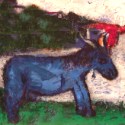
[ Our Torah portion this week introduces us to an enigmatic character named Balaam, the so-called "cursing prophet." Please read the Torah portion to "find your place" here. ]
07.06.11 (Tammuz 4, 5771) Balaam was jealous and grandiose, a flamboyant and self-styled "prophet" and interpreter of dreams who used the Divine Name for purposes of sorcery. Inwardly he desired to curse Israel, as is evidenced by his willingness to go along with the evil intent of king Balak. He was a madman who dabbled in the occult and was adept at playing the role of the accuser before the LORD. Ironically, when he accused his donkey of "mocking" him, God opened the mouth of the beast to rebuke him for his perversity of heart. Balaam was a prototype of "Haman" whose malice and jealously ultimately destroyed him.
Balaam was also greedy. Some say that the word Pethor (the place of where he dwelt) comes from the Aramaic word Pethora (פְּתוֹרָה) that means "moneychanger's table." Balaam might have been a "banker" who made loans, and he was enticed by the love of money. It is noteworthy that the Torah states that Balak made his evil appeal to Balaam by sending his messengers with "the fees for divination (קֶסֶם) in their hand" (Num. 22:7). Peter refers to the "way of Balaam" as the love of the wages of unrighteousness (2 Pet. 2:15), and Jude likewise warns us that false teachers will resemble Balaam because they seek the applause of men and offer "instruction" for their own profit (Jude 1:11).
Though he apparently had great potential -- Jewish tradition sometimes describes him as a "pagan counterpart" of Moses himself -- Balaam was ultimately a sorcerer who sought to manipulate God (Josh. 13:22). He often received his "visitations" during the night, calculating the precise time to make his appeal for revelation. Despite originally hearing God say "no" to the plan to curse Israel, Balaam apparently believed he could "change God's mind," and therefore when Balak sent a second set of messengers with a more lucrative offer, we see Balaam questioning God's commandment in the hope of going ahead with the evil mission. Interestingly, despite God's apparent consent to Balaam's second appeal (Num. 22:20), His anger was kindled over his willingness to go, so much so that the Angel of the LORD (מַלְאַךְ יְהוָה) stood in his way as an adversary (שָׂטָן) to him (Num. 22:22). Perhaps God's anger came because His second answer amounted to a test as to whether he would obey God or lust after his own heart's desire (Psalm 81:12). Ironically it was Balaam's donkey who saved his life, despite his mistreatment of her. When Balaam finally saw the Angel with his sword drawn, he fell to the ground prostrate, just as did his donkey...
After being rebuked for the perversity of his way (first by the donkey and then by the Angel), Balaam voiced a word of "repentance," though it was undoubtedly insincere, since he said, "if you are displeased, I will go back," again suggesting that God could change His mind regarding cursing Israel. Initially Balaam's words of repentance may seem to have been sincere, though the entire point of the episode was to let him know that he would be able to speak in a manner similar to his donkey. Indeed, the three times the donkey miraculously saw what Balaam didn't corresponded to the three oracles Balaam saw later. In fact, the donkey foretold of Balaam's mission, and Balak later responded just as Balaam did to his donkey - by smacking his hands together in exasperation (Num. 24:10). Moreover, as soon as the imminent threat of God's judgment had passed, Balaam chose to continue on his way to meet with Balak, knowing full well the king's intentions... When he finally arrived in Moab, he then sought to "bribe" God by means of sacrifices (Num. 23:4), perhaps suggesting that he thought he could still influence God's mind on the subject. Where it is written, "God put a word in his mouth" (Num. 23:5), the idea is that God thrust it into his throat as forcefully as one who drives a nail into a board.
Why did Moses rebuke the Israelites while Balaam blessed them? The sages answer that this demonstrates God's unconditional love for his people. To understand Balaam's inner motives, you can simply reverse the meaning of the blessings he was forced to utter by God. For example, when he said, "How goodly are your tents, O Jacob, your Tabernacle, O Israel," his wicked heart desired the tents to be filled with corruption and Israel devoid of the Divine Presence... God overruled Balaam's evil intent because He loves the Jewish people.
Balaam was not a true prophet but rather a great enemy of Israel. Despite receiving direct revelations from God, the "oracles of blessing" he parroted over Israel were not the result of his free will, since he was little more than a "talking donkey" before the LORD. No, Balaam was utterly perverse within his heart, as evidenced by the wicked advice he later gave to king Balak about how to seduce the Israelites into disobeying God. His perversity is mentioned later in the New Testament: "Balaam, who taught Balak to put a stumbling block before the sons of Israel, that they might eat food sacrificed to idols and practice immorality" (Rev. 2:14). Balaam was later killed in a battle between Israel and the Midianites, when he came to collect his "reward" for the incident at Baal Peor which caused 24,000 Jews to die in the desert (Num. 31:8).
Incidentally, the term "Baal Peor" (בַּעַל פְּעוֹר) refers to an ancient semitic god of the "openings" associated with excrement and exposure… Baal means "lord" and the Hebrew stem (פּער) means "open," used to refer to both the mouth and bowels. Balaam "son of Beor" might mean that he was a prophet of Baal of Peor, and that is why the Torah refers to the sin of the Israelites with the women of Moab - the scheme Balaam later hatched to curse Israel - as "the incident at Baal Peor" (Deut. 4:3).
The irony of Balaam is highly prophetic. It was from Mount Peor, a place of gross idolatry, that God took hold of the false prophet's tongue and made him repeat the promise given to Abraham: "Blessed are those who bless you, and cursed are those who curse you" (Num. 24:9; Gen. 12:3). Such is the fate of all those who attempt to curse the Jewish people. One day every knee will bow before Yeshua, the "Star from Jacob" whose scepter will rule the entire earth (Num. 24:17). Meanwhile we can take comfort that "there is no enchantment against Jacob, no divination against Israel" (Num. 23:23). אֵין עוֹד מִלְבַדּו / ein od milvado: "there is no power apart from Him" - no weapon formed against God's people will prosper.
Note: There is some question as to who was worse - king Balak or the false prophet Balaam... King Balak was a superstitious pagan who believed in the power of magic. In light of his fear that Israel was an "ox" who would lick up the grass of the field (a symbol of pagan deity), he decided to ally himself with the princes of Midian, who knew Jethro, Moses' father-in-law. This was a shrewd political move on Balak's part. These Midian princes told Balak that Moses' power came by invoking the Name of the LORD (שֵׁם יְהוָה), and therefore he needed to enlist the services of Balaam, a distant relative of Israel (from Aram) who understood the the Divine Name and could use it to spiritually confound the Israelites. Balaam, on the other hand, was a little more than a sorcerer whose motive was based more on personal malice than politics, as evidenced by his abuse of the Divine Name as a means of bringing harm to God's people (Josh. 13:22). Indeed, Balaam represented Israel's last peril east of the Jordan River, and therefore his schemes represent Satan's last attempt to thwart Israel's possession of the Promised Land. Perhaps it is a moot point to ask which of the two was more wicked, since both sought to undermine the purposes of the LORD God of Israel. However, the story of Balaam is a warning that those who attempt to manipulate God by invoking His Name for evil ends will surely share his fate...
 |
Parashat Balak - פרשת בלק

[ The following entry concerns this week's Torah reading, parashat Balak. Please read the Torah portion to "find your place" here. ]
07.03.11 (Tammuz 1, 5771) This week's Torah is named after an evil Moabite king (בָּלָק) who sought to curse the Jews by enlisting the assistance of an Midianite "seer" named Balaam (בִּלְעָם). According to midrash, Balaam was one of the great pagan prophets who, along with Jethro and Job, were descendants of Abraham's brother Nachor. King Balak's plan was to use spiritual powers (i.e., kishuf: כִּשּׁוּף - the occult and magic) to war against Israel before they reached the Promised Land. Of course Balak's scheme was upended, and the curse he sought to put on the Jewish people was repeatedly pronounced as a blessing by Balaam instead. An exasperated Balak finally dismissed the prophet from his service, but before departing from the forlorn king, Balaam ironically prophesied the destruction of the Moabites and the victory of God's people....
According to Jewish tradition, Jacob's wicked uncle Laban had a son named Beor (בְּעוֹר) who became the father of Balaam. In other words, the "cursing prophet" Balaam was none other than the grandson of Laban:
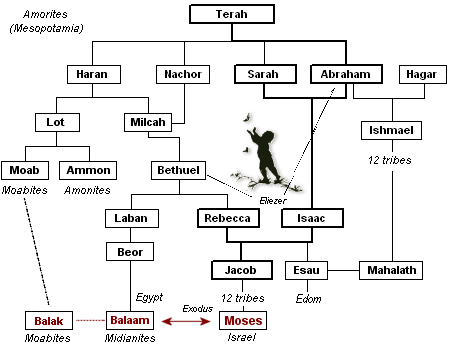 |
Note that the name "Beor" first appears in connection with a king of Edom (Gen. 36:32), which suggests that Balaam might have once been a king of the Edomites (i.e., the descendants of Esau). Further note the phonetic similarity to Peor. If Beor and Peor are the same, then Balaam was actually a prophet of Baal Peor, a local Semitic god.
Balaam was regarded as a great seer, magician and an adept in the occult. He had an "evil eye" and drew the spirit of demons to anything he gazed upon (Avot 5:22). His notoriety made him famous, and powerful people asked him to invoke curses on their enemies. The Talmud (Sanhedrin 106a) states that Balaam became so famous as a magician that he later became a chief advisor to Pharaoh. It was Balaam who advised the new Pharaoh to enslave the Israelites and to afflict them with brutal taskmasters (Exod. 1:8-11). For more information about the identity of Balaam, see the entry entitled, "The Curses of Balaam."
Personal Update: I really need your prayers for this ministry - and for my emotional and physical health... There is a lot of warfare that accompanies doing this work, and every day is a battle. Please pray especially for my physical health, since I suffer from chronic pain and other issues that often affect me in difficult ways. Thank you so much.
 |
Hebrew for Christians Forum

07.02.11 (Sivan 30, 5771) Instead of using Facebook, some people prefer a more interactive (and private) forum that also allows for discussion of various topics and articles related to their faith. If this sounds interesting, you might want to join the (free) Hebrew for Christians online chavurah.
Note that in order to participate in the forum, however, you must send me a personal e-mail and provide the following information:
- Your real name and e-mail address.
- A brief explanation why you wish to join the forum.
- A statement about your understanding of who Yeshua (Jesus) is.
- Your desired User Name for the forum (5 characters, minimum).
After I receive your email, I will either send you an application with further questions or else you will be notified that your account has been activated.
|
|


































